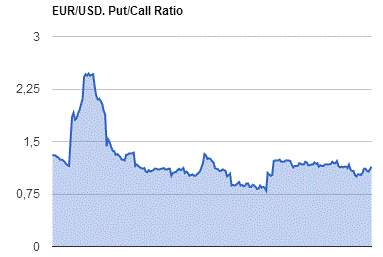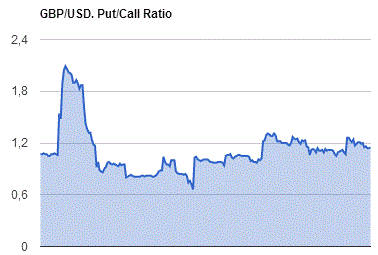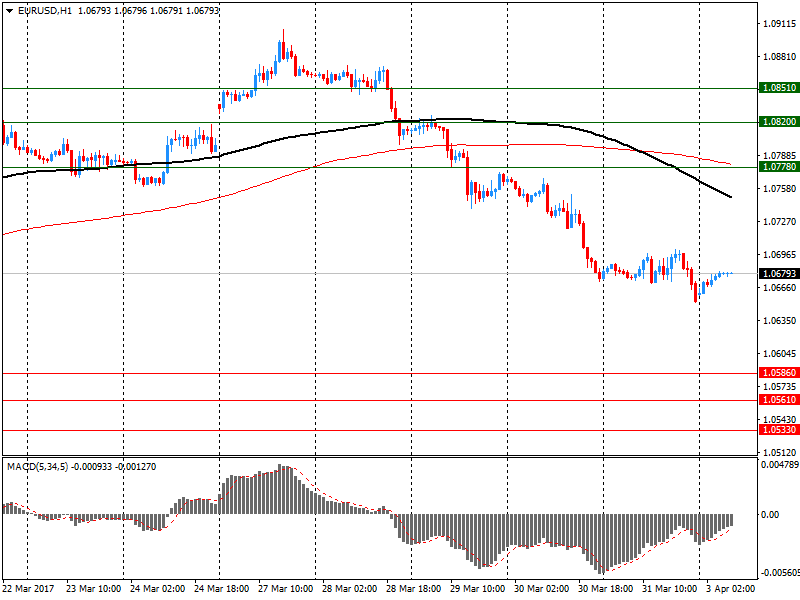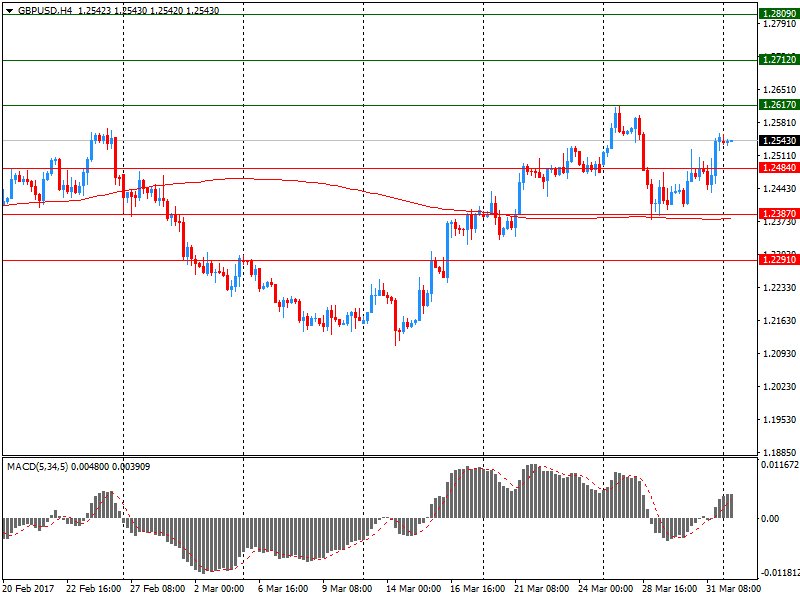Noticias del mercado
-
16:52
Bank of Canada survey: on balance, firms in all sectors and regions plan to add jobs over next 12 months
-
Many firms expect increase in expenditures over next 12 months to be modest
-
Balance of opinion on investment intentions increased in q1 survey; suggests plans to invest have become more widespread
-
Expect somewhat faster export growth; growing number of firms expect U.S growth to be strong
-
Firms expect some increase in sales growth; balance of opinion of indicators of future sales at highest level in five years
-
Inflation expectations marginally higher than q4 survey; majority of firms still expect inflation to be in lower half of BoC's control range
-
Capacity pressures remain modest overall, suggesting slack persists
-
-
16:04
US manufacturing sector continued to expand strongly in March - ISM
The report was issued today by Bradley J. Holcomb, CPSM, CPSD, Chair of the Institute for Supply Management (ISM) Manufacturing Business Survey Committee:
"The March PMI registered 57.2 percent, a decrease of 0.5 percentage point from the February reading of 57.7 percent. The New Orders Index registered 64.5 percent, a decrease of 0.6 percentage point from the February reading of 65.1 percent. The Production Index registered 57.6 percent, 5.3 percentage points lower than the February reading of 62.9 percent.
The Employment Index registered 58.9 percent, an increase of 4.7 percentage points from the February reading of 54.2 percent. Inventories of raw materials registered 49 percent, a decrease of 2.5 percentage points from the February reading of 51.5 percent. The Prices Index registered 70.5 percent in March, an increase of 2.5 percentage points from the February reading of 68 percent, indicating higher raw materials prices for the 13th consecutive month. Consistent with generally positive comments from the panel, all 18 industries reported growth in new orders for the month of March."
-
16:00
U.S.: ISM Manufacturing, March 57.2 (forecast 57)
-
16:00
U.S.: Construction Spending, m/m, February 0.8% (forecast 1.1%)
-
15:45
U.S.: Manufacturing PMI, March 53.3 (forecast 53.4)
-
15:34
March data signalled a robust and accelerated improvement in business conditions across the Canadian manufacturing sector - Markit
March data signalled a robust and accelerated improvement in business conditions across the Canadian manufacturing sector, driven by faster rises in production, new orders and employment. Survey respondents widely commented on a boost from stronger domestic demand in March, especially among energy sector clients. Manufacturers also reported positive sentiment regarding the year-ahead outlook, which underpinned the greatest rise in payroll numbers since June 2012.
Meanwhile, cost pressures intensified in March. Efforts to alleviate pressures on margins meant that factory gate prices were raised at the steepest pace for exactly three years. The seasonally adjusted Markit Canada Manufacturing Purchasing Managers' Index™ (PMI™) rose from 54.7 in February to 55.5 in March, to remain above the crucial 50.0 no-change value for the thirteenth consecutive month. Moreover, the latest reading signalled the fastest improvement in manufacturing business conditions since October 2013.
-
15:31
Option expiries for today's 10:00 ET NY cut
EURUSD: 1.0735 (EUR 986m) 1.0750 (350m) 1.0780 (185m) 1.0800 (375m)
USDJPY: 110.00 (USD 342m) 110.25 (610m) 111.40 (400m) 111.50 (360m) 111.90-112.00 (625m) 112.25 (230m) 112.60-70 (640m)
GBPUSD: 1.2500 (GBP 212m) 1.2650 (175m)
AUDUSD: 0.7600 (AUD 242m)
USDCAD 1.3350-55 (USD 230m) 1.3400 (190m)
-
14:48
Germany's Merkel says security is not just about defence spending, but also political solutions and development aid
-
Wants to raise defence spending further after september election
-
Want to limit damage from Brexit
-
-
14:21
Brazil's 2017 inflation forecast 4.10 pct vs 4.12 pct previous week
-
2018 year-end selic rate forecast 8.50 pct vs 8.50 pct previous week
-
2018 gdp growth forecast 2.50 pct vs 2.50 pct previous week
-
-
14:00
Orders
EUR/USD
Offers: 1.0685 1.0700 1.0725-30 1.0760 1.0775-80 1.0800
Bids: 1.0650 1.0630 1.0600 1.0580 1.0565 1.0550
GBP/USD
Offers: 1.2550-55 1.2585 1.2600 1.2620 1.2650 1.2680 1.2700
Bids: 1.2520 1.2500 1.2480 1.2465 1.2450 1.2430 1.2400 1.2375-80 1.2350
EUR/JPY
Offers: 119.00 119.20 119.50 119.80 120.00
Bids: 118.65 118.50 118.30 118.00 117.85 117.50
EUR/GBP
Offers: 0.8520-25 0.8550 0.85665 0.8585 0.8600 0.8630 0.8650
Bids: 0.8500 0.8485 0.8465 0.8450 0.8430 0.8400
USD/JPY
Offers: 111.65 111.80 112.00 112.20 112.50
Bids: 111.30 111.00 110.80 110.50 110.20 110.00
AUD/USD
Offers: 0.7620 0.7650 0.7665 0.7680-85 0.7700
Bids: 0.7580 0.7565 0.7550 0.7500
-
13:18
Bank of Spain sees high inflation at start of year as "transitory”
-
12:28
Far-right's Le Pen to get 25 pct (+1) in 1st round of french election, Macron 24 pct (unchanged), Fillon 19 pct (unchanged) - Opinionway poll
-
Fillon would beat le pen in run-off vote by 58 pct to 42 pct if Fillon made it through to second round
-
Macron seen beating Le Pen in run-off vote by 63 pct
-
-
11:45
Gibraltar's leader says the territory will not tolerate being a bargaining chip or a victim of the Brexit negotiation
-
11:22
Industrial producer prices remained stable in the euro area
In February 2017, compared with January 2017, industrial producer prices remained stable in the euro area (EA19), while they rose by 0.1% in the EU28, according to estimates from Eurostat, the statistical office of the European Union. In January 2017 prices increased by 1.1% in both zones. In February 2017, compared with February 2016, industrial producer prices rose by 4.5% in the euro area and by 5.3% in the EU28.
Industrial producer prices in total industry remained stable in the euro area in February 2017, compared with January 2017, due to rises of 0.6% for intermediate goods, of 0.2% for non-durable consumer goods and of 0.1% for both capital goods and durable consumer goods, while prices fell by 1.1% in the energy sector. Prices in total industry excluding energy rose by 0.3%.
-
11:21
The euro area (EA19) seasonally-adjusted unemployment rate was 9.5% in February
The euro area (EA19) seasonally-adjusted unemployment rate was 9.5% in February 2017, down from 9.6% in January 2017 and from 10.3% in February 2016. This remains the lowest rate recorded in the euro area since May 2009.
The EU28 unemployment rate was 8.0% in February 2017, down from 8.1% in January 2017 and from 8.9% in February 2016. This remains the lowest rate recorded in the EU28 since January 2009. These figures are published by Eurostat, the statistical office of the European Union.
Eurostat estimates that 19.750 million men and women in the EU28, of whom 15.439 million were in the euro area, were unemployed in February 2017. Compared with January 2017, the number of persons unemployed decreased by 153 000 in the EU28 and by 140 000 in the euro area. Compared with February 2016, unemployment fell by 1.852 million in the EU28 and by 1.246 million in the euro area.
-
11:00
Eurozone: Unemployment Rate , February 9.5% (forecast 9.5%)
-
11:00
Eurozone: Producer Price Index (YoY), February 4.5% (forecast 4.3%)
-
11:00
Eurozone: Producer Price Index, MoM , February 0.0% (forecast 0.3%)
-
10:36
German manufacturing PMI rose in line with expectations in March
The upturn in the eurozone manufacturing sector gathered further pace at the end of the first quarter. Rates of expansion in production and new orders accelerated to near six-year highs, as companies saw stronger inflows of new work from domestic and export clients.
The final Markit Eurozone Manufacturing PMI rose to a 71-month record of 56.2 in March, up from 55.4 in February and unchanged from the earlier flash estimate. The average PMI reading over the first quarter as a whole (55.6) was the highest since the opening quarter of 2011
-
10:35
The performance of the UK manufacturing sector remained solid at the end of the first quarter - Markit
Although rates of expansion in output and new orders lost further impetus following recent highs, they remained above the respective long-run averages. The domestic market was a key source of new business wins. The boost to export competitiveness from the weak sterling exchange rate also contributed to new work inflows.
The seasonally adjusted Markit/CIPS Purchasing Managers' Index (PMI slipped to a four-month low of 54.2 in March, down from 54.5 in February, but stayed above the neutral mark of 50.0 for the eighth successive month. The latest PMI reading compared favourably to its long-run trend (51.6). The average over the opening quarter as a whole (54.7) was identical to the prior quarter's near three-year high.
-
10:30
United Kingdom: Purchasing Manager Index Manufacturing , March 54.2 (forecast 54.6)
-
10:04
Forex option contracts rolling off today at 14.00 GMT:
EURUSD: 1.0735 (EUR 986m) 1.0750 (350m) 1.0780 (185m) 1.0800 (375m)
USDJPY: 110.00 (USD 342m) 110.25 (610m) 111.40 (400m) 111.50 (360m) 111.90-112.00 (625m) 112.25 (230m) 112.60-70 (640m)
GBPUSD: 1.2500 (GBP 212m) 1.2650 (175m)
AUDUSD: 0.7600 (AUD 242m)
USDCAD 1.3350-55 (USD 230m) 1.3400 (190m)
-
10:00
Eurozone: Manufacturing PMI, March 56.2 (forecast 56.2)
-
09:55
Germany: Manufacturing PMI, March 58.3 (forecast 58.3)
-
09:50
France: Manufacturing PMI, March 53.3 (forecast 53.4)
-
09:30
Switzerland: Manufacturing PMI, March 58.6
-
09:16
Switzerland: Retail Sales Y/Y, February 0.6%
-
08:25
Trump To Tell Xi: “If China Is Not Going To Solve North Korea, We Will” @zerohedge
-
08:24
There was a further improvement in the health of Japan’s manufacturing economy during March says Markit
There was a further improvement in the health of Japan's manufacturing economy during March, with growth underpinned by rising levels of output, new orders and employment. Although rates of expansion eased in all cases, they nonetheless remained solid and were underpinned by marked gains in the capital goods sector. While yen depreciation provided some positive support to new export orders, the corollary was further inflation in imported goods prices. This led to another marked rise in manufacturers' input costs, which served to eat into margins as manufacturers were in general unable to pass on higher costs to clients.
The headline Japan Manufacturing Purchasing Managers' IndexTM - a composite singlefigure indicator of manufacturing performance - slipped to its lowest level of the year so far in March. Down from 53.3, the PMI posted a level of 52.4, a reading consistent with solid growth. March also marked the seventh month in succession that an improvement in sector health has been recorded.
-
08:19
Australian retail turnover fell 0.1 per cent in February
Australian retail turnover fell 0.1 per cent in February 2017, seasonally adjusted, according to the latest Australian Bureau of Statistics (ABS) Retail Trade figures.
This follows a rise of 0.4 per cent in January 2017.
In seasonally adjusted terms, there were falls in clothing, footwear and personal accessory retailing (-2.5 per cent) and household goods retailing (-0.4 per cent). These falls were offset by rises in food retailing (0.3 per cent) and department stores (0.8 per cent). Other retailing, and cafes, restaurants and takeaway food services were relatively unchanged (0.0 per cent).
-
08:16
ECB’s Praet: April Reduction Of Asset Purchases Doesn’t Signal Start Of Gradual Reduction - Reuters
-
Probability of having to provide more monetary accommodation has reduced considerably
-
Underlying inflation remains subdued in euro zone
-
Euro zone economy gaining momentum but still must be confirmed by hard data
-
Ecb has won the battle against deflation
-
-
08:10
The number of dwellings approved in Australia rose 0.8 per cent in February
The number of dwellings approved rose 0.8 per cent in February 2017, in trend terms, after falling for eight months, according to data released by the Australian Bureau of Statistics (ABS) today.
Dwelling approvals increased in February in New South Wales (2.5 per cent), Victoria (1.4 per cent), Tasmania (0.9 per cent) and South Australia (0.5 per cent), but decreased in the Australian Capital Territory (15.6 per cent), Northern Territory (12.3 per cent), Queensland (0.7 per cent) and Western Australia (0.2 per cent) in trend terms.
In trend terms, approvals for private sector houses fell 0.6 per cent in February. Private sector house approvals fell in South Australia (1.7 per cent), Western Australia (0.6 per cent), New South Wales (0.5 per cent), Victoria (0.3 per cent) and Queensland (0.1 per cent).
In seasonally adjusted terms, dwelling approvals increased by 8.3 per cent in February, driven by a rise in total dwellings excluding houses (11.0 per cent) and total house approvals (5.7 per cent).
-
07:03
Options levels on monday, April 3, 2017
EUR/USD
Resistance levels (open interest**, contracts)
$1.0851 (755)
$1.0820 (1081)
$1.0778 (450)
Price at time of writing this review: $1.0679
Support levels (open interest**, contracts):
$1.0586 (755)
$1.0561 (729)
$1.0533 (1443)
Comments:
- Overall open interest on the CALL options with the expiration date June, 9 is 45295 contracts, with the maximum number of contracts with strike price $1,1450 (3940);
- Overall open interest on the PUT options with the expiration date June, 9 is 49558 contracts, with the maximum number of contracts with strike price $1,0350 (3831);
- The ratio of PUT/CALL was 1.09 versus 1.08 from the previous trading day according to data from March, 31

GBP/USD
Resistance levels (open interest**, contracts)
$1.2809 (1163)
$1.2712 (861)
$1.2617 (368)
Price at time of writing this review: $1.2543
Support levels (open interest**, contracts):
$1.2484 (559)
$1.2387 (579)
$1.2291 (315)
Comments:
- Overall open interest on the CALL options with the expiration date June, 9 is 15681 contracts, with the maximum number of contracts with strike price $1,3000 (1253);
- Overall open interest on the PUT options with the expiration date June, 9 is 17626 contracts, with the maximum number of contracts with strike price $1,1500 (3056);
- The ratio of PUT/CALL was 1.12 versus 1.13 from the previous trading day according to data from March, 31

* - The Chicago Mercantile Exchange bulletin (CME) is used for the calculation.
** - Open interest takes into account the total number of option contracts that are open at the moment.
-
03:32
Australia: ANZ Job Advertisements (MoM), March 0.3%
-
03:31
Australia: Building Permits, m/m, February 8.3% (forecast -0.5%)
-
03:31
Australia: Building Permits, m/m, February 8.3% (forecast -0.5%)
-
03:30
Australia: Retail Sales, M/M, February -0.1% (forecast 0.3%)
-
03:01
Australia: MI Inflation Gauge, m/m, March 0.1%
-
02:34
Japan: Manufacturing PMI, March 52.4 (forecast 52.6)
-
01:51
Japan: BoJ Tankan. Manufacturing Index, Quarter I 12 (forecast 14)
-
01:51
Japan: BoJ Tankan. Non-Manufacturing Index, Quarter I 20 (forecast 20)
-
01:31
Australia: AIG Manufacturing Index, March 57.5
-
00:27
Currencies. Daily history for Mar 31’2017:
(pare/closed(GMT +2)/change, %)
EUR/USD $1,0653 -0,26%
GBP/USD $1,2552 +0,67%
USD/CHF Chf1,0027 +0,21%
USD/JPY Y111,39 -0,40%
EUR/JPY Y118,68 -0,65%
GBP/JPY Y139,8 +0,26%
AUD/USD $0,7627 -0,24%
NZD/USD $0,7003 +0,07%
USD/CAD C$1,332 -0,11%
-
00:02
Schedule for today,Monday, Apr 03’2017 (GMT0)
00:30 Japan Manufacturing PMI (Finally) March 53.3 52.6
01:00 Australia MI Inflation Gauge, m/m March -0.3%
01:30 Australia ANZ Job Advertisements (MoM) March -0.7%
01:30 Australia Retail Sales, M/M February 0.4% 0.3%
01:30 Australia Building Permits, m/m February 1.8% -0.5%
06:30 Eurozone ECB's Benoit Coeure Speaks
07:15 Switzerland Retail Sales (MoM) February 0.6%
07:15 Switzerland Retail Sales Y/Y February -1.4%
07:30 Switzerland Manufacturing PMI March 57.8
07:50 France Manufacturing PMI (Finally) March 52.2 53.4
07:55 Germany Manufacturing PMI (Finally) March 56.8 58.3
08:00 Eurozone Manufacturing PMI (Finally) March 55.4 56.2
08:30 United Kingdom Purchasing Manager Index Manufacturing March 54.6 54.6
09:00 Eurozone Producer Price Index, MoM February 0.7% 0.3%
09:00 Eurozone Producer Price Index (YoY) February 3.5% 4.3%
09:00 Eurozone Unemployment Rate February 9.6% 9.5%
13:45 U.S. Manufacturing PMI (Finally) March 54.2 53.4
14:00 U.S. Construction Spending, m/m February -1% 1.1%
14:00 U.S. ISM Manufacturing March 57.7 57
14:30 Canada Bank of Canada Business Outlook Survey
14:30 U.S. FOMC Member Dudley Speak
19:00 U.S. FOMC Member Harker Speaks
20:00 U.S. Total Vehicle Sales, mln March 17.58 17.35
21:00 U.S. FOMC Member Laсker Speaks
22:00 New Zealand NZIER Business Confidence Quarter I 28%
-

